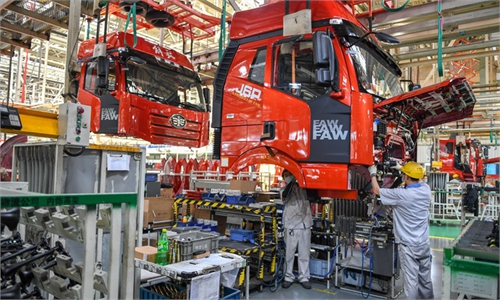Private Caixin manufacturing PMI edges up at 49.2 in October, though remaining in contraction territory: survey

The manufacturing line of a NEV factory in Southwest China's Chongqing Municipality Photo: VCG
China's manufacturing activity contracted in October, as the resurgence of COVID-19 pandemic adversely affected market demand in the country, according to a private survey published on Tuesday.
The Caixin manufacturing purchasing managers' index (PMI) came in at 49.2 in October, up 1.1 percentage points from September. However, it has run in contracting territory for three consecutive months since August, which indicated a continued manufacturing activity decline.
A reading above 50 indicates expansion, while a reading below 50 reflects contraction. The Caixin PMI mostly tracks small and medium-size private-owned enterprises.
The official manufacturing PMI in October released by the National Bureau of Statistics on Monday stood at 49.2 too, its lowest reading in the past three months, following a rebounding in September.
Affected by the COVID-19 resurgences, supply and demand of the country's manufacturing sector contracted in October. The sub-index of production and new orders for the services sector in October remained in contraction territory in light of weakened demand in consumption and investment.
Foreign demand continued to decline too. The export orders index remained in the contraction range for the third consecutive month, because of the slowdown in overseas markets.
Weakness in the broad manufacturing sector continued to drag down workers' employment. In October, the employment index was in contraction range for the seventh consecutive month, as most enterprises were reluctant to add head count amid worsening market demand.
Due to the rising prices of raw materials in the international market, manufacturing companies faced growing cost in October. And, pandemic restrictive measures had an impact on logistics, with enterprises stating that the coronavirus flare-ups caused delivery delays.
The negative economic impact of the epidemic was felt throughout October, said Wang Zhe, a senior economist at Caixin Insight Group, noting that the incessant coronavirus flare-ups in the country restricted both market supply and demand, destabilizing the foundation of economic recovery.
According to Wang, as market demand and employment remain under pressure, the government policies to promote employment and stabilize domestic demand still need to be ramped up.
"The relevant authorities should enhance the coordination of fiscal and monetary policies, focus on expanding domestic demand, and strengthen the fundamental role of consumption in economic development, and the key role of investment in optimizing supply structure," Wang noted.
Global Times


